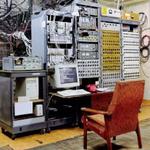 EC145 schrieb:Und es war sicher auch der Wunsch von RFK das LBJ in Dallas an Bord der Air Force One vereidigt wurde.
EC145 schrieb:Und es war sicher auch der Wunsch von RFK das LBJ in Dallas an Bord der Air Force One vereidigt wurde.
Hast du dafür eine Quelle?
Von wem stammt die Aussage? von LBJ selbst? Oder einem seiner Freunde bzw. Mitarbeiter?
 Nemon schrieb:Ich schreib ja hier nicht mehr.
Nemon schrieb:Ich schreib ja hier nicht mehr.
Warum? Wegen der Recherchen Palamaras?
 Nemon schrieb:Außer den Link von eben, wo der Funkverkehr aus der AF1 protokolliert ist.
Nemon schrieb:Außer den Link von eben, wo der Funkverkehr aus der AF1 protokolliert ist.
Da sind Zweiflern an der OT auch schon Verdachtsmomente aufgefallen.
https://midnightwriternews.com/1154-2/ (Archiv-Version vom 20.11.2018) Nemon schrieb:Ein Artikel zu einem Buch, das die Tochter des JFK-Beraters Kenneth O’Donnell, der dann zu LBJ wechselte, veröffentlicht hat.
Nemon schrieb:Ein Artikel zu einem Buch, das die Tochter des JFK-Beraters Kenneth O’Donnell, der dann zu LBJ wechselte, veröffentlicht hat.
Es geht hier u. a. um die Szenen in der Notaufnahme.
New Book Details How Jackie Wouldn't Leave Dallas Without John F. Kennedy's Body
Interessant ist, dass Jackie in dem Artikel gar keine aktive Rolle einnimmt und keine Entschiedungen trifft, sie wollte nur beim Leichnam bleiben.
Das rückt andere Personen in den Vordergrund.
An 11-23-86 article by Valenti for the Los Angeles Times foreshadowed his subsequent comments, and asserted that the decision to take the oath in Dallas was Johnson's alone. Valenti wrote: "Constitutional lawyers state that when a President dies, the Vice-president automatically becomes chief executive. No oath is necessary. But LBJ was not beguiled by what is merely legal. He knew the nation and the world were inspecting this alien cowboy assuming command of the greatest industrial and military power on the face of the earth. He knew that symbolism and perception meant far more than a mere legal opinion. So he ordered Federal District Judge Sarah Hughes to be brought to administer the oath."
And that wasn't the last time Valenti indicated it was Johnson who'd made the decision about the oath. A 7-15-91 interview with authors Deborah Hart Strober and Gerald S. Strober, published in The Kennedy Presidency, An Oral History of the Era, quotes Valenti as claiming "Johnson had determined he'd be sworn in in Dallas, which was a brilliant move, although Robert Kennedy and Katzenbach suggested he get out of there fast." While this shores up the probability Johnson made the decision he be sworn in in Dallas, it does little, unfortunately, to clear up the related question of when Johnson came to this decision--before or after talking to Kennedy.
In 2007, Valenti published This Time, This Place, a memoir. Thankfully, this clears it up a little. In that Valenti presented the phone calls Johnson made once in the air--such as his phone call to President Kennedy's mother--as taking place when Johnson first reached the plane, this book revealed that Valenti's latter-day memories weren't particularly credible. And yet, it's still of interest that Valenti claimed Johnson consulted with Deputy Attorney General Katzenbach and Attorney General Kennedy before his departure from Dallas, and that they urged "swift departure," and that Katzenbach had further told Johnson the oath was just a "formality" and that he could be "formally sworn in later." Hmmm... No mention of Kennedy's opinion. Perhaps Valenti was trying to steer clear of that controversy. In any event, he then wrote that, against the advice of Katzenbach and Secretary of Defense Robert McNamara, Johnson decided to stay put and get sworn in in Dallas. He then asserted that "Johnson was seeing clearly what others didn't. The swearing-in ceremony wasn't essential to grant him presidential authority, but he saw that the entire world, not just the United States, was in a state of shock. LBJ judged it crucially important that he try to stanch the flow of fear before it spread too far too fast. Though I did not know it, LBJ had already summoned Judge Sarah T. Hughes."
Well, that confirms it. By 1988, if not long before, Valenti had come to believe Johnson's claim Robert Kennedy had told him to be sworn in before leaving Dallas was untrue, and that Johnson had come to this decision entirely on his own, almost certainly before he'd even spoken to Kennedy.
Conclusion number 8: Johnson lied about the timing of his call to Robert Kennedy, and from the very beginning tried to conceal that he'd called Irving Goldberg and Sarah Hughes' office before ever calling Kennedy.
http://www.patspeer.com/chapter-21-things-that-make-me-say-hmmm Nemon schrieb:ie BU zum Kofferaumdeckel-Foto ist natürlich komplett daneben, der Artikel ist, soweit ich es beim Lesen beurteilen konnte, faktisch korrekt.
Nemon schrieb:ie BU zum Kofferaumdeckel-Foto ist natürlich komplett daneben, der Artikel ist, soweit ich es beim Lesen beurteilen konnte, faktisch korrekt.
Woran machst du fest, dass es faktisch korrekt ist?
 Nemon schrieb:Man beachte die verschiedenen entscheidenden Stellen bezüglich des Themas, das hier gerade aufgemacht wurde, v. a. D. das Telefonat mit RFK. Das war aber anscheinend nie richtig aufgelöst.
Nemon schrieb:Man beachte die verschiedenen entscheidenden Stellen bezüglich des Themas, das hier gerade aufgemacht wurde, v. a. D. das Telefonat mit RFK. Das war aber anscheinend nie richtig aufgelöst.
Tja...
The first is from McGeorge Bundy, President Kennedy's national-security advisor; the second is from Walter Jenkins, one of Johnson's most trusted aides. Both men tell him he should return to the capital immediately. Johnson says he will not leave without Jackie Kennedy, and she has let it be known that she will not leave without her husband's body. These dominoes must fall in order. Johnson does not want to be remembered as an abandoner of beautiful widows.
Robert Kennedy calls back. The specifics of this conversation will be forever debated; several of that day's calls are recorded, but no recording of this one has ever surfaced. According to Johnson's account, Kennedy tells him he should take the oath in Dallas, and that it is imperative. Kennedy later denies he said anything of the sort.
https://www.esquire.com/news-politics/a24834/flight-from-dallas-1013LBJ behauptete, dass RFK ihn zur Vereidigung in Dallas geraten hätte. LBJ wusste, dass Jackie sich von dem Leichnam nicht trennen wollte, folglich heißt das, dass er wenn er jackie bei sich haben, auch den LEichnam bei sich haben wollte.
Dass McGeorge Bundy ihm riet, nach Washington zu kommen ist sehr interessant.
Bundy funkte auch Air Force 1 später auf dem Flug nach Washington, dass ein Einzeltäter das Attentat ausgeführt habe und keine Verschwörung hinter dem Mord stecken würde.
Theodore H. White, in his book The Making of the President, 1964, told us that on the afternoon of November 22, 1963, the Presidential party on Air Force One “... learned that there was no conspiracy, learned of the identity of Oswald and his arrest ...” Air Force One had landed at Andrews Air Force Base, at 5:59 P.M. on November 22, 1963. In correspondence with me, Mr. White stated that this message was sent to the Presidential party from the Situation Room of the White House.
This same message was confirmed by Pierre Salinger in his book With Kennedy. Mr. Salinger received that same message while on the Cabinet Plane which was flying over the Pacific Ocean. Mr. Salinger tried to get those data to me and had instructed the National Archives to provide them for me, but they disappeared from the National Archives. My inquiries to the White House Communications Agency requesting a copy of the Air Force One Tapes were dismissed in a letter sent to me by James U. Cross, Armed Forces Aide to the President. He wrote on January 2, 1968, that the logs and tapes of the radio transmissions “... are kept for official use only. These tapes are not releasable, nor are they obtainable from commercial sources.”
...
The first announcement of Oswald as the lone assassin, before there was any evidence against him, and while there was overwhelmingly convincing evidence of conspiracy, had come from the White House Situation Room. Only the assassins could have made that premature declaration that Oswald was the assassin. This announcement had been made while back in Dallas District Attorney Henry Wade was stating that “preliminary reports indicated more than one person was involved in the shooting ...”[20]
I have asked and ask again, can there be any doubt that for any innocent government, taken by surprise by the assassination – and legitimately seeking the truth concerning it – the White House Situation Room message was sent too soon? The government could not have known at that time that Oswald was the killer and that there was no conspiracy. The persons on Air Force One and the plane carrying the cabinet members over the Pacific who heard that message and who do not come forward at this time to fill in the now deleted portion of the tape from the Situation Room of the White House, are they not accessories after the fact?
The person who on November 22, 1963 had been in direct control of the White House Situation Room, the President’s Assistant for National Security Affairs, was McGeorge Bundy. Bundy was a hard-liner on foreign policy. He had been a student of CIA’s covert operations chief, Richard Bissell, who had been fired by President Kennedy after the Bay of Pigs. Bundy in 1948 had worked for Bissell on the Marshall Plan. Bundy was a man of considerable intelligence. He did not out of stupidity inform the Presidential party that Oswald was the lone assassin before there was any evidence against him and while there was compelling evidence of conspiracy. Did he not do this to inform the Presidential Party who had been in the motorcade that this was a matter of state, the importance of which rose higher than Anglo-Saxon principles of justice?
https://www.ratical.org/ratville/JFK/FalseMystery/COPA1998VJS.html#s29 (Archiv-Version vom 15.06.2019)Merkwürdig ist, dass im uns erhaltenen Funkverkehr von Af1 diese Übertragung nicht zu finden ist- ein Schelm, wer Böses dabei denkt.
 Nemon schrieb:Wer gewinnt aus dem Ganzen den Eindruck, Johnson habe nur auf diesen Moment gewartet bzw. die Fäden gezogen?
Nemon schrieb:Wer gewinnt aus dem Ganzen den Eindruck, Johnson habe nur auf diesen Moment gewartet bzw. die Fäden gezogen?
Erinnere dich daran, was LBJ schon 1960 sagte:
When it became clear to Johnson that he could not reach the top of the ticket, he began to consider the second spot. He had his staff look up how many presidents in the previous hundred years had died in office--five out of eighteen, giving him a better than 20 percent chance of reaching the presidency that way. When Clare Boothe Luce later asked him why he would accept the nomination to be number two, he answered: "Clare, I looked it up: one out of every four Presidents has died in office. I'm a gamblin' man, darlin', and this is the only chance I got." He said much the same thing to trusted journalists. So it was clear why Johnson would run with the "sickly" John Kennedy. He knew about the ailments that could threaten his life.
http://econlog.econlib.org/archives/2012/05/great_moments_i_4.html
Do we learn things from Caro that we did not know from other biographies of Johnson, such as Robert Dallek’s two excellent volumes? Yes, many. Caro tells us, as Dallek does not, that before the 1960 convention Johnson asked his staff an unusual question: How many presidents died in office? Caro relates that when Claire Booth Luce asked Johnson why he wanted such a powerless position, Johnson reportedly responded: “Clare, I looked it up; one out of every four Presidents has died in office. I’m a gamblin’ man, darlin’, and this is the only chance I got.”
http://www.washingtonindependentreviewofbooks.com/bookreview/the-passage-of-power-the-years-of-lyndon-johnson
Und dass er die "Fäden" zog ist ein Strohmannargument- es kann sein, dass jemand aus seinem Umfeld die Fäden zog und LBj einfach nur gewisse Aktionen "geschehen lassen" musste.
Emory Roberts, der während der Schüsse den USSS-agenten befahl, sich nicht vom Fleck zu rühren, behielt seinen Job unter LBj und wurde dessen treuester Mitarbeiter und Freund.
To you, and Emory Roberts, who I am sorry can't be here today--he greets me every morning and tells me goodby every night-to all the members of your family, I want to say that I believe of all the employees that I have known in the Federal Government in 38 years that I have worked, from a doorkeeper, to secretary, to Congressman, Senator, and Vice President, I don't believe that I have ever seen any collective group that is possessed with as much integrity, as much character, as much selflessness, and as much courage as your men.
http://www.presidency.ucsb.edu/ws/?pid=29254 (Archiv-Version vom 30.09.2018)
Fast dasselbe hat LBJ über seinen Freund Bobby Baker gesagt ("e greets me every morning and tells me goodby every night")
https://books.google.de/books?id=YA4CBAAAQBAJ&pg=PT241&lpg=PT241&dq=emory+roberts+lbj&source=bl&ots=A7F8dl_cVb&sig=u6dqZEv9h0v4muZyIkzEURCb3U8&hl=de&sa=X&ved=0ahUKEwinq8bXvZvZAhXBzxQKHSQPCp8Q6AEIWTAG#v=onepage&q=emory%20roberts%20lbj&f=falseWikipedia: Bobby Bakerhttps://www.washingtonpost.com/local/obituaries/bobby-baker-protege-of-lyndon-johnson-felled-by-influence-peddling-scandal-dies-at-89/2017/11/17/ffb7ce04-cc06-11e7-b0cf-7689a9f2d84e_story.html (Archiv-Version vom 28.02.2020) http://presidentjohnsonlbjsecretservice.blogspot.com/
http://presidentjohnsonlbjsecretservice.blogspot.com/Informeire dich auch mal über den Fall Billy Sol Estes und die Todesfälle in Zusammenhang mit LBJ während seiner Zeit als Senator
https://spartacus-educational.com/JFKestes.htmhttps://spartacus-educational.com/JFKhaleyE.htm Groucho schrieb:Wie konkret in diesem Fall. Welche Vorteile sollte Johnson (in Bezug auf die VT) denn gehabt haben, wenn er schon im Flugzeug vereidigt wird, statt erst in Washington?
Groucho schrieb:Wie konkret in diesem Fall. Welche Vorteile sollte Johnson (in Bezug auf die VT) denn gehabt haben, wenn er schon im Flugzeug vereidigt wird, statt erst in Washington?
Das könnte rein narzisstische Gründe gehabt haben, wie bei nicht wenigen Politikern. Es könnte auch sein, da sich alle im Raum versammelten, in dem die Vereidigung stattfinden würde, sich die Gelegenheit bot, sich an JFKs sarg und Leiche zu schaffen zu machen.
 behind_eyes schrieb:Gibt es irgendein Indiz, ein Hinweis, irgendwas was du damit in Zusammenhang bringen kannst?
behind_eyes schrieb:Gibt es irgendein Indiz, ein Hinweis, irgendwas was du damit in Zusammenhang bringen kannst?
Wikipedia: Nachfolge_des_Präsidenten_der_Vereinigten_Staaten
Da, anders als in parlamentarischen Regierungssystemen, der Präsident im amerikanischen politischen System vom Volk gewählt wird (durch ein Wahlmännerkollegium) und eine vorgezogene Neuwahl nicht vorgesehen ist, bedarf es einer genauen Regelung, wie mit dem Wegfall des Präsidenten umzugehen ist: Eine einfache Nachwahl etwa durch das Parlament ist nicht möglich. Andererseits ist eine auch zeitlich lückenlose Ersatznachfolge unbedingt erforderlich, da der Präsident gleichzeitig Staatsoberhaupt, Regierungschef und Oberbefehlshaber der Streitkräfte ist.
Laut LBJs mitarbeiter Jack Valenti war eine Vereidigung nicht notwendig- wenn der Präsident stirbt, wird der Vize-Präsident automatisch sein Amtsnachfolger.
An 11-23-86 article by Valenti for the Los Angeles Times foreshadowed his subsequent comments, and asserted that the decision to take the oath in Dallas was Johnson's alone. Valenti wrote: "Constitutional lawyers state that when a President dies, the Vice-president automatically becomes chief executive. No oath is necessary. But LBJ was not beguiled by what is merely legal.
http://www.patspeer.com/chapter-21-things-that-make-me-say-hmmm behind_eyes schrieb:ber auch dieser Fall zeigt wiedermal, daß das VT-Hamsterrad zum größten Teil durch Unwissenheit und oder fehlender Bildung am Laufen gehalten wird.
behind_eyes schrieb:ber auch dieser Fall zeigt wiedermal, daß das VT-Hamsterrad zum größten Teil durch Unwissenheit und oder fehlender Bildung am Laufen gehalten wird.
Du sagst es.
;)








